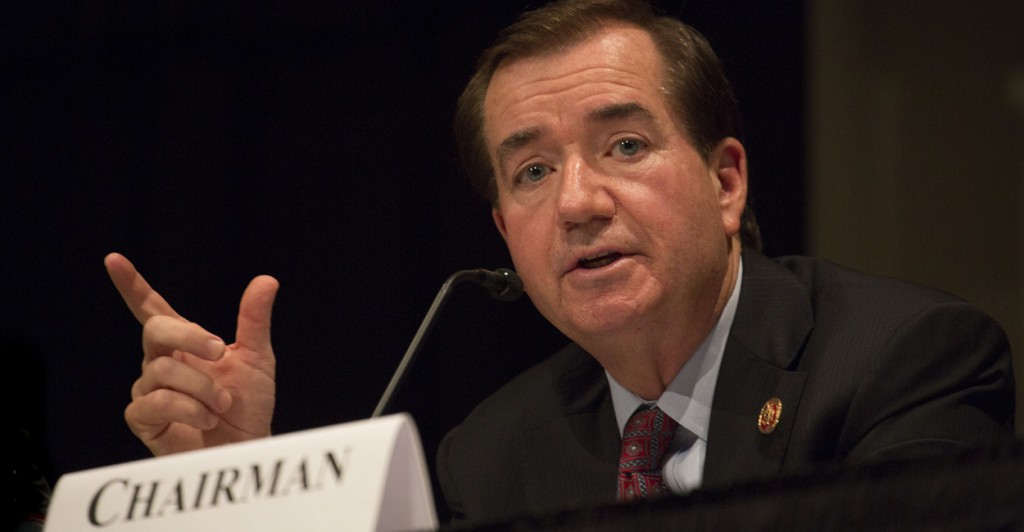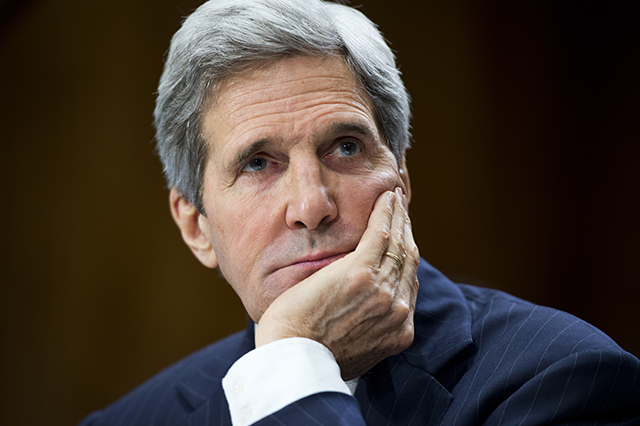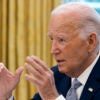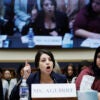In his State of the Union address, President Obama had a strong message for a Congress angling to impose new sanctions on Iran: stay out of my way.
Obama argued that additional punishments would undermine ongoing negotiations between the U.S. and Iran to prevent Tehran from having the capability to make a nuclear weapon.
At first, his blunt warning did little to sway the Senate, which had planned to bring to the floor a sanctions bill, authored by Robert Menendez, D-N.J., and Mark Kirk, R-Ill.
But Tuesday, a group of Senate Democrats whose votes would have been needed to pass the legislation abruptly relented, writing in a letter to Obama that they will give the White House a two-month reprieve before pushing for more sanctions.
The senators said they would wait until at least late March.
House Speaker John Boehner deepened the staredown between the legislative and executive branch on Iran when last week, he invited Israeli Prime Minister Benjamin Netanyahu to speak before Congress on the topic.
Below, The Daily Signal answers burning questions that still surround the ongoing nuclear saga — with repercussions felt from the U.S. to Iran to Israel.
What is the status of negotiations?
In November, Iran, the U.S. and five other world powers failed to resolve their 12-year standoff over Tehran’s nuclear ambitions, extending a deadline for talks until July, with the goal of reaching a framework for a deal by the end of March.
At the time, negotiators insisted that an interim agreement would continue to restrain any attempt by Iran to develop a nuclear weapon.
Among other things, the interim agreement — reached more than a year ago — limits the number of centrifuges Iran can operate to enrich uranium, preventing new ones from coming on line, and restricts the level of enrichment to below what would be needed to develop a nuclear weapon.
At the time, lead U.S. negotiator and Secretary of State John Kerry declined to reveal the gaps remaining in the talks.
But news reports said that disagreements centered on the number of centrifuges Iran is allowed to permanently operate and how much uranium could be enriched, as well issues of international inspections.
Iran claims its nuclear program is peaceful and exists only to produce energy for civilian use.
At a hearing Tuesday, the top Republican on the House Foreign Affairs Committee doubted that the extension of talks had forced the Iranians to concede anything.

House Foreign Affairs Committee Chair Ed Royce doubts the Iranians will concede anything in negotiations over its nuclear program. (Photo: CSUF Photos/ CC BY-NC-SA 2.0)
“Negotiations, now into their second extension, appear to be stalemated,” said Rep. Ed Royce, R-Calif. “Meanwhile, Tehran has been advancing its nuclear program. These actions clearly violate the spirit of the interim agreement. Yet the administration seems more concerned that sanctions could sink an agreement. Let’s be clear: if an agreement is sunk, it is because Iran has no interest in abandoning its drive to nuclear weapons, which is what many of us believe.”
“Let’s be clear: if an agreement is sunk, it is because Iran has no interest in abandoning its drive to nuclear weapons, which is what many of us believe,” says @RepEdRoyce.
Iran is currently under some sanctions. How are those working out?
At the House Foreign Affairs Committee hearing, Robert J. Einhorn, a senior fellow at the Brookings Institution in Washington, asserted that the current sanctions enacted under the interim agreement are having a powerful impact on Iran’s economy.
“Iran continues to feel immense pressure under existing sanctions,” said Einhorn, who once served as assistant secretary of state for nonproliferation under President Bill Clinton.
“Although companies around the world have held discussions with Iran in the hope of entering or reentering the Iranian market, they are taking a very cautious approach, waiting for a nuclear deal to be concluded and sanctions to be removed before taking the risk of signing new contracts. The Treasury Department estimates that in 2014, oil sanctions alone deprived Iran of about $40 billion in oil revenues.”

Secretary of State John Kerry is leading negotiations with Iran over its nuclear program. Photo: Tom Williams/CQ Roll Call/Newscom
But though its economy is hobbled, Iran has been experiencing some economic growth and lowered inflation in trying to rebound from a recession.
If talks collapse and Iran works to build a nuclear bomb, why would that matter?
Eric S. Edelman, the under secretary of defense in the Bush administration, said at the House hearing that preventing a nuclear Iran is “the most pressing national security challenge today.”
“It would threaten the elimination of Israel and risk triggering a nuclear-arms race in region,” Edelman said.
Iran is thought to be assisting Shi’a militias in Iraq, which Edelman says has “fed the resurgence of the Islamic State.”
In Syria, Iran’s Islamic Revolutionary Guard Corps provides aid to the brutal regime of President Bashar al-Assad.
And Iran-backed Houthi rebels in Yemen have taken over much of the country in recent months, resulting in the resignation of the country’s American-backed president.
How would additional sanctions help or hurt the negotiations meant to stop Iran’s nuclear ambitions?
Einhorn believes Congress should stay out of the way, even though the sanctions being talked about would only go into effect if the new negotiation timeline passes without a deal.
“New sanctions legislation at this time, even if not imposed until later on, would have the unintended effect of hardening Iran’s position and weakening the U.S. position,” Einhorn said.
“Opponents would seize on this by saying that the U.S. has no intention of ultimately removing sanctions, therefore an agreement is pointless. We should be patient.”
Freshman Democratic Rep. Brendan Boyle of Pennsylvania, speaking at the Tuesday hearing, has a more nuanced position on Congress’ role in the success or failure of the talks.
“I am someone who is generally a supporter of the president, but with that said, I can’t understand the logic of saying that if there are no sanctions today but sanctions by a day certain, how we would be seen as responsible for sinking these negotiations,” Boyle said.
No matter the showdown in Congress, Iran’s ultimate position will be determined by Iran’s supreme leader, Ayatollah Ali Khamenei, who is seen as skeptical of the talks.
“My view is that if the supreme leader wants a deal, there will be a deal,” Edelman told The New York Times.




























